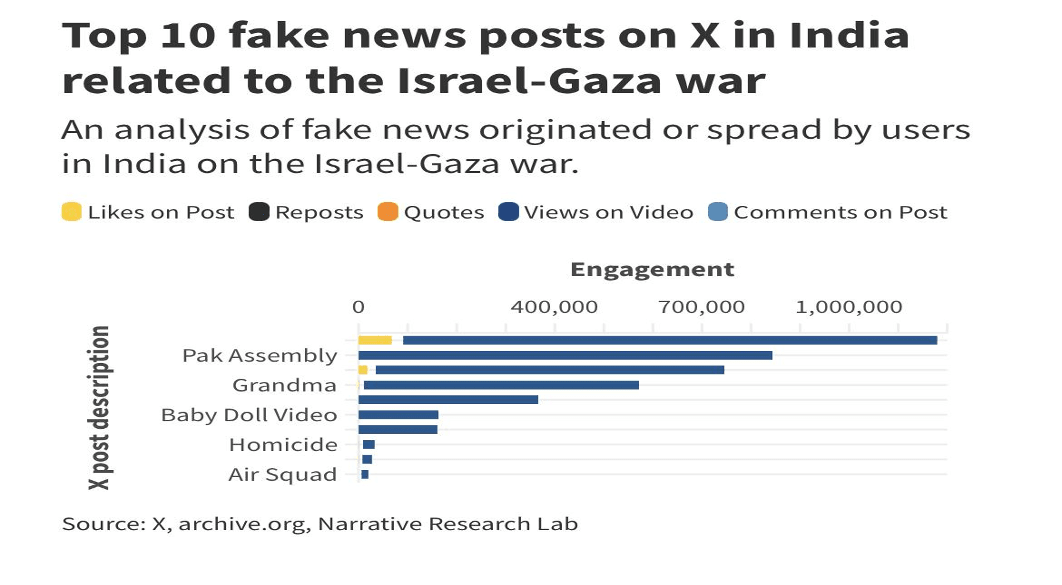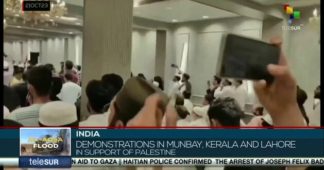Disinformation and jingoism against Palestinians is becoming widespread on Indian media and social media
by Mohammad Asif Khan
Nov 10, 2023
In the wee hours of 7 October, 2023, Hamas, the Palestinian Resistance group based in Gaza, launched a surprise attack on Israel, code named operation Al-Aqsa flood; it started firing rockets and sending gunmen across the border, who took hostages. The Israeli military has responded with heavy airstrikes and a ground invasion of Gaza in the counter operation.
The initial reaction from Indian media was to label the operation as a terrorist attack, Firstpost Indian news website owned by News 18 which covers International affairs, labelled the attack as an invasion of the State of Israel by Hamas in its headline. Its firebrand anchor, Palki Sharma, known for her angry and nationalistic rhetoric on international events labeled the attackers as terrorists.
Nearly all mainstream broadcast channels echoed her suit. Many Indian journalists drew parallels to the 26/11 terrorist attack In Mumbai. Others, like right wing news anchor, Arnab Goswami, compared Hamas with separatists in the Kashmir valley.
Indian media was the leading proponent of spreading fake news about 40 beheaded babies, which was later found to be false. Indian media, including outlets like Republic, NDTV, Times of India and Times Now, spread false news about 40 beheaded babies during the Israel-Palestine conflict.
War Mongering is not new for Indian TV channels. During the 2019 Pulwama attack in Kashmir, there were loud calls for immediate action on Pakistan and a formal declaration of war by mainstream Indian channels.
India’s Prime Minister, Narendra Modi’s official tweet, expressing solidarity with Israel and labelling Hamas operatives as “terrorists”, mirrors the narrative echoed by Indian media. This stance diverges from India’s official policy, which does not designate Hamas as a terrorist organisation.
India’s historic support for the Palestinian cause
Historically, India has been supportive of the Palestinian people. It rejected the UN partition plan for Palestine in 1947 and, in 1974, India became the first non-Arab state to recognise the Palestine Liberation Organisation (PLO) as the sole and legitimate representative of the Palestinian people.
Palestine experienced colonisation at the same time India gained independence. Its land was forcibly taken from its inhabitants. Around 530 Palestinian villages and towns were destroyed, causing 7.5 million Palestinians to become refugees in the tragedy known as Al Nakba.
In 1938, Mahatma Gandhi, who is revered as “Father of the Nation” by India, had famously said, “Palestine belongs to the Arabs in the same sense that England belongs to the English or France to the French.”
In 1988, India was one of the first countries to recognise the State of Palestine. India also opened a Representative Office in Gaza in 1996, which was later shifted to Ramallah in 2003. India had no diplomatic relations with Israel until 1992.
Commenting on India’s historic relations with Israel, Dr. Mosheer Amer, Professor of Linguistics at the English Department of the Islamic University of Gaza, says:
“Historically, India had traditionally been supportive of the Palestinian people. The strong ties that we have seen between the Israeli Occupation State and Modi’s government come at the expense of the rights and aspirations of the Palestinian people.”
The current policy calls for a two state solution with Israel and Palestine living side by side, a stance reiterated by India amidst the current conflict.
In recent years, India has grown closer to Israel and support for Palestine has dwindled significantly under Modi’s rise to power in India.
In 2017, Indian Prime Minister, Narendra Modi, became the first Indian Prime Minister to visit Israel. This shift in policy is attributed to the rise of Modi and Hindu Nationalism in India, which shares admiration for Israel.
This admiration is loudly echoed and celebrated by the mainstream media in India.
“There are strong ties between the Netanyahu’s extremist government and India’s Modi’s government, who share similar right-wing ideological orientations in relation to a host of issues,” Dr. Mosheer Amer adds.
Pool of disinformation against Palestinians
Indian media is using language that is sympathetic to Israel and dehumanising to Palestinians.
Scores of reporters from major Indian broadcast channels like NDTV, India Today and News 18, etc., have been present on the ground to report on the current conflict. The behaviour of some correspondent media outlets has raised serious concerns. Reporters are staging dramatic scenes in front of moving tanks and anchors are resorting to dramatic visual effects to portray missile strikes.
This display of sensationalism and nationalistic fervour has not only overshadowed the gravity of the situation, but has also transformed the coverage into a spectacle of noise and theatrics.
Indian social media users, particularly on social media platform X, are flooded with anti-Palestinian posts filled with misinformation about the ongoing war, often posted by right wing users aligned with the ideology of India’s Hindu nationalist BJP party.
Indian influencers have been found spreading disinformation targeting Palestine negatively and supporting Israel, as found by fact-checking service, BOOM. They have shared misleading videos, one falsely claiming Hamas kidnapped a Jewish baby, garnering millions of views. Most of these accounts were based in India.
An analysis of fake news originated or spread by users in India by the Narrative Research Lab quoted by Al Jazeera in its report reveals the scale of disinformation against Palestinians being spread through X.
Out of 4,316 tweets analyzed with the keyword “We Indians”, around 1,250 supported Israel and about 250 supported Palestine in the Israel-Palestine conflict. This indicates a five-to-one ratio in favour of Israel. Additionally, a significant number of Indian accounts used the hashtag “#IstandwithIsrael” on social media.
The spread of false information is being amplified by a network of India’s right-wing followers. They use this false information to support their cause, which relies heavily on strong emotional reactions from people who share these beliefs. In the current conflict, some Hindu nationalists are using Israel’s strong response to Hamas and the attacks on Gaza to further their anti-Muslim agenda.
We remind our readers that publication of articles on our site does not mean that we agree with what is written. Our policy is to publish anything which we consider of interest, so as to assist our readers in forming their opinions. Sometimes we even publish articles with which we totally disagree, since we believe it is important for our readers to be informed on as wide a spectrum of views as possible.












